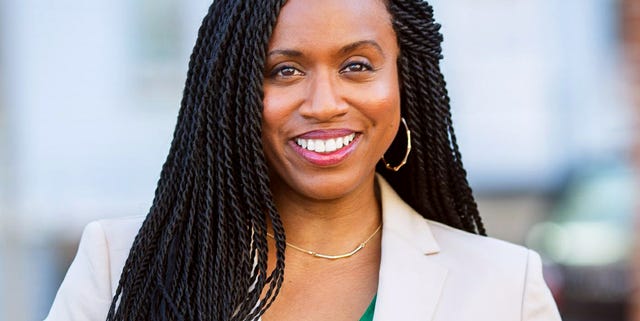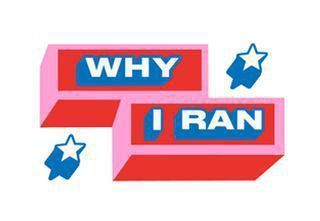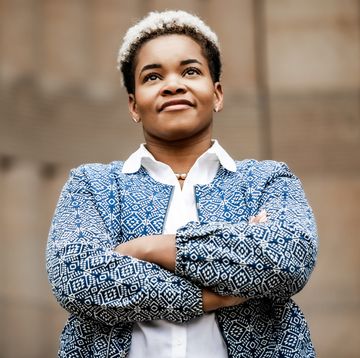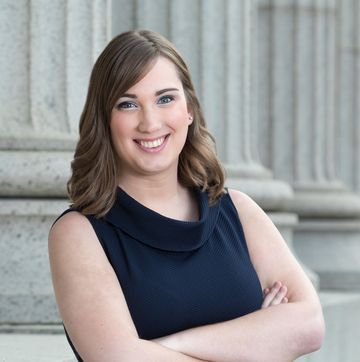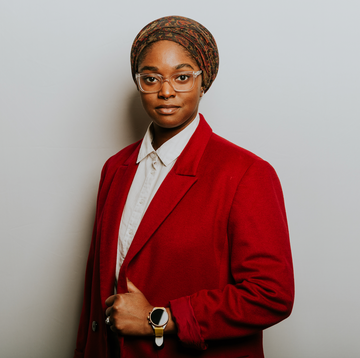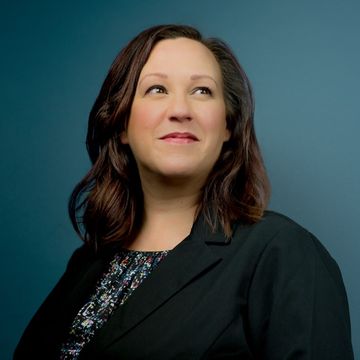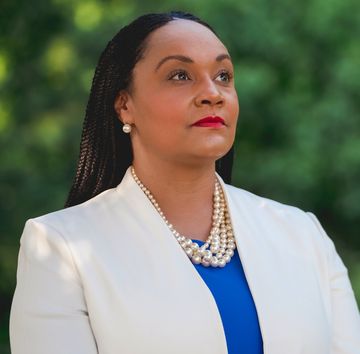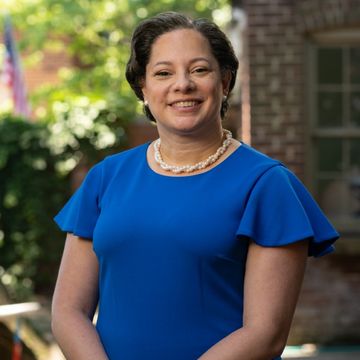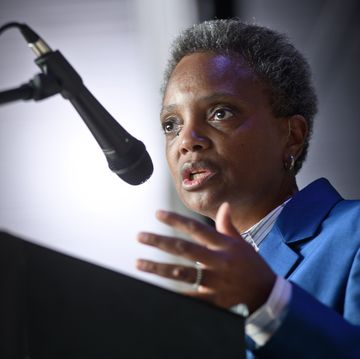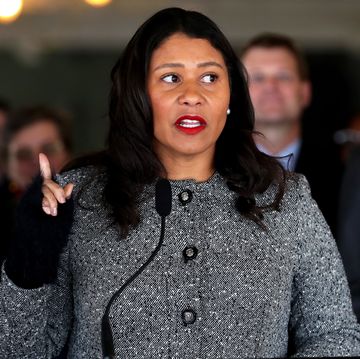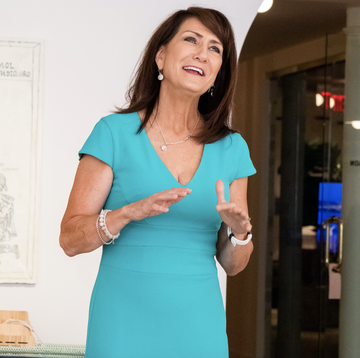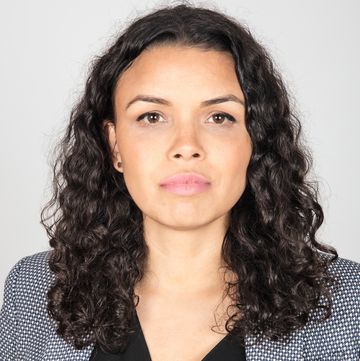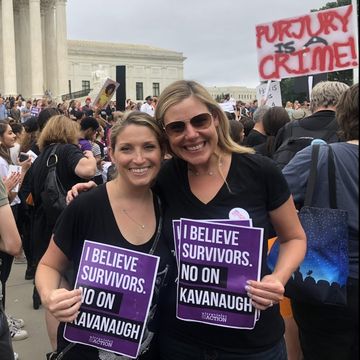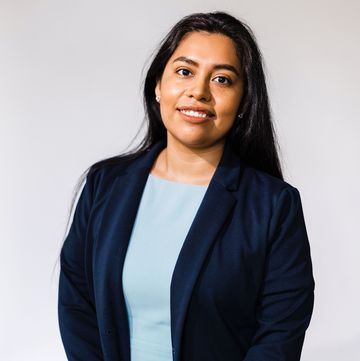Historically, women have needed to be convinced to enter politics. But within weeks of the 2016 presidential election, thousands of women announced they planned to run. And we want them to win. So we're giving them a monthly example of a woman who has run. The point: You can, too.
Throughout this midterm cycle, Ayanna Pressley has often been compared to another breakout Democratic star: Alexandria Ocasio-Cortez. The similarities are there: they're both women of color running to unseat longtime incumbents in deep blue districts. But Pressley, who won her primary on Sept. 4th, is also a star in her own right. In 2009, she became the first woman of color ever elected to the Boston City Council, and in 2016, the New York Times named her one of "14 Young Democrats to Watch." She's now poised to become the first black woman to represent Massachusetts in the U.S. House of Representatives, as there are no Republicans running on the ballot in November.
Here, she explains why she decided to run.
Raising me as a single parent, my mother held many jobs. Most of them had to do with the betterment and the advancement of our community and society at large. I grew up seeing her active in ministries at our church, with the homeless, as a social worker, with elderly, with youth, as a children’s rights organizer with the Urban League of Chicago. She took me with her to vote in every election.
Public service and community organizing and movement building is such a part of my DNA that it’s really hard to separate it. It’s just all I’ve ever known and the only way that I’ve ever really wanted to make a contribution to the world.
[Growing up] I was living a very interesting sort of dual reality. I had one reality on my neighborhood block and in that community where, although there were many good people, there were a lot of things that also had me feeling vulnerable and not always operating with a sense of self agency or having peace of mind. At the same time, I would take a city bus from that neighborhood across the city to a school that my mother made a lot of financial sacrifice to send me to. I went to a school with the kids of judges and elected officials and architects, civil leaders, and influencers. And I felt very much a minority in every way. But it did expose me to incredible things. I lead in many ways a very compartmentalized existence. A lot of different realities and all of those experiences certainly shape who I am, my world view, the issues that I champion and how I go about advancing that agenda.
Advocates and people I had been doing work with approached me about considering a run [for city council]. After a lot of prayer and contemplation, I made the decision to run. And I made the decision to make the focal point of my candidacy girls and the need for there to be specific policies and protocols to meet the needs of girls because there was not enough of it happening throughout the city level. I knew that because anytime I was in the community and volunteering, girls would get my cell phone number and they would call me at all hours saying that their uncle touched them, they needed help, their boyfriend was pressuring them to have sex, they thought they were pregnant and can they take a pregnancy test at my house, they’d just come out to their parents and been kicked out of the house. Somewhere they were being failed, and I wanted to do the work to address those gaps. So ultimately that’s why I ran.
Truthfully, I never ran to make history. I don’t think people that make history set out to make it. There’s nothing redeeming about that. I was aware that if I was successful I would be the first woman of color, but it wasn’t the motivating force behind my run. And I don’t think I had a true grasp of the gravity of it until I was in the position. Then I had an appreciation for the responsibility, the blessing, the burden, and the opportunity of being the first anything. I was also the only woman running in that field of 15 candidates and was completely oblivious to it until some of the first pictures of our debate were printed in the newspaper.
Everyone told me that I would have to run more than once to win because that had been the pattern. I think that my desire to make healthier, safer communities and to specifically champion the safety and development of women and girls was a transcendent agenda and one that resonated for many people from many walks of life. It’s also important to note that, since I was elected to the council, five more women have joined the body and all of them identify as women of color. Although each of these women worked hard and earned their own seat, I do take it as a sense of personal pride, as do my team members, that we broke that double glass ceiling and we blazed a trail.
I know our [Congressional] campaign is one that is disruptive and makes a lot of people uncomfortable in a dark blue district where we don’t primary Democrats, but I think we are in different times. These are times that require bold activist leadership and a reliable vote.
I am black and a woman and unapologetically proud to be both. But I’ve never asked anyone to vote for me because I’m black and a woman. I’m asking people to consider me because I’m pledging to be a vote, a voice, and a partner. I’m asking people to vote for me because I’m an activist leader and a problem solver.
I don’t feel like a star. I don’t feel particularly brave. What I do feel is a tremendous responsibility and it is that responsibility that keeps me putting one foot in front of the other on the days when I am tempted to feel defeated and to play it small. This is a defining moment for our country, and I believe it is a defining moment for the district. And I am refusing to play small.
This interview has been edited and condensed for clarity.
